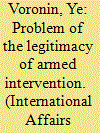| Srl | Item |
| 1 |
ID:
117399


|
|
|
|
|
| Publication |
2012.
|
| Summary/Abstract |
THE ATLANTIC ALLIANCE'S military intervention in Libya, like similar actions by Western community nations (in Yugoslavia, Iraq, Kosovo), which have questioned the principles and rules of modern international law, above all the principle of state sovereignty, does not appear to have received proper, qualified legal evaluation as yet.
Apart from being out of tune with the mandate under United Nations Security Council resolution 1973, the anti-Libyan military action by NATO countries was also not in keeping with Article 42 of the UN Charter, on which rests the contemporary application of the doctrine about coercive measures involving the use of armed force. The decision on the use of force was sanctioned by the Security Council, but the character of its "unlimited" use was fixed by a group of leading Western powers, with participation from NATO's military structures. Modern practice provides for the Security Council to delegate limited powers to use military force.1 In the case of Libya, the provision of a mandate allowing limited use of force in the form of establishing a no-fly zone over Libyan territory to prevent the Qaddafi regime's use of deadly force against its own people was not accompanied by any UN participation in the form of auxiliary functions of peacekeeping nature (surveillance, monitoring) - as it was for example in the peace settlement under the Dayton Accords, or with the "parallel strategy" in Bosnia and Herzegovina.
|
|
|
|
|
|
|
|
|
|
|
|
|
|
|
|
| 2 |
ID:
144977


|
|
|
|
|
| Summary/Abstract |
IT IS WITH GOOD REASON that we speak of the legal thought of Russia, and the school of Fyodor Martens, in the first place, as part of the contemporary doctrine of international law, a common heritage of the European legal tradition. His school was completely devoted to the principles of international law and the rule of law as the linchpin of foreign policy of all civilized states that rejected force as a means of settling interstate disagreements and a tool of prevention of European clashes.
|
|
|
|
|
|
|
|
|
|
|
|
|
|
|
|